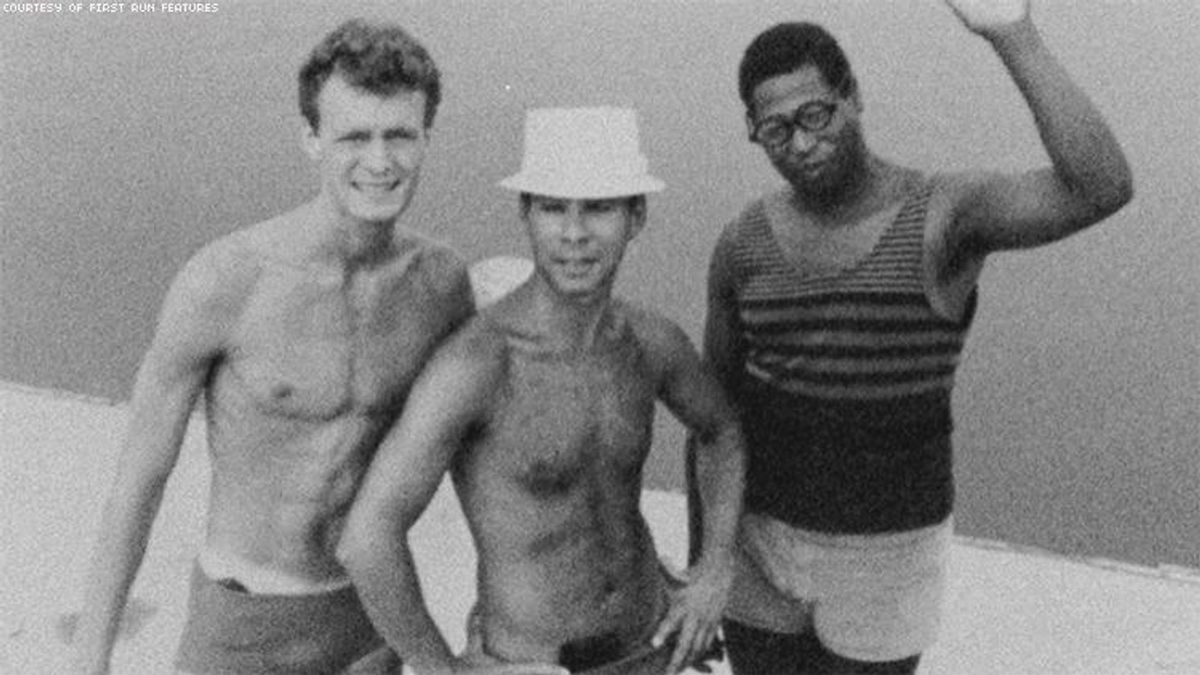It's been 34 years since documentarian Greta Schiller and a team of researchers excavated the history LGBTQ people who paved the way for what became the tipping point of the 1969 riots at New York City's Stonewall Inn. A remarkable chronicle of queer history when it was released in 1985, Before Stonewall: The Making of a Gay and Lesbian Community (which has been rereleased in time for the 50th anniversary of the riots) has itself become an artifact of LGBTQ history that was ahead of its time.
Narrated by renowned lesbian novelist Rita Mae Brown, Before Stonewall paints a portrait of LGBTQ Americans who were forced to live in closets and underground but who found each other and ways to express their identities just the same.
Through archival video, still photographs, music, and interviews with queer pioneers including Ann Bannon, Harry Hay, Audre Lorde, Frank Kameny, Gladys Bentley, Allen Ginsberg, Lisa Ben, and dozens more, Schiller and her team reconstructed the lived experience of so many LGBTQ people of the early 20th century. Due to the passage of time and the AIDS epidemic that wiped out so several of the film's subjects, Before Stonewall has become an irreplaceable piece of LGBTQ history that gives voice to activists who may have never conceived of something like marriage equality when they were fighting for their lives at a time when homosexuality was still considered a mental disorder.
"I'm looking at age 64 now, [the age] many of the people I interviewed were. They seem so old and wise," Schiller tells The Advocate about subjects in the film who are gone. "It makes me really sad. So many -- I'd love them to be around and see this thing."
Still, she says it's "extraordinary" that new audiences are able to take in the film thanks to the work of the UCLA Film and TV Archive that preserved the negative.
"I just was blown away that both the people who saw it the first time out and the people who had never seen it before were like, 'It feels so contemporary,'" she says of the film in which she and the team had the foresight to afford nearly equal screen time to men and women and to tackle issues around the intersections of sexuality, gender, and race.

"I was really adamant that we have enough women and have people of color," Schiller says, adding that the film's research director, Andrea Weiss, has since reminded her of that fact.
"Do you remember when we were doing the research and we were bringing back all these stories?" Schiller says Weiss asked her. "At one point you said, 'I can't hear one more white man's story. We have enough. We need to stop.'"
Culling stories from queer women was more difficult for various reasons, but Schiller, Weiss, and the core team that included co-director Robert Rosenberg, executive producer John Scagliotti, and editor Bill Daughton found a way to afford equal time to women's stories.
"Lesbians are women, and women were then and are now more vulnerable economically," Schiller says. "If you had kids, all you had to say was you were lesbian and your kids would be taken away. You could lose your job. You could be socially ostracized. There was a risk for people to appear [in the film]."

Greta Schiller
One scene that features an exchange between Lorde and another queer woman of color speaks to intersectionality before the term was coined. The remarkable footage that Schiller and her team shot about 35 years ago consists of the two black queer women discussing how white lesbians would express sympathy for women of color who are further terrorized because of race but who wouldn't stand up for them or speak out -- a discussion that has of late become a flashpoint in discussions of white feminism.
For all Before Stonewall got right and even telegraphed about the future of discussions around LGBTQ identities, Schiller would change a few things if she could go back to the scrappy filmmaker she was then. While the movie regales viewers with lively stories of communities of gay men and lesbians in the military and softball leagues teeming with queer women along with so many other previously untold stories, she says they missed a few things.
One effect of living in the closet Schiller says she would go back and investigate is alcohol abuse among LGBTQ people.
"I didn't look at the devastating effects of alcohol and alcoholism on the community and the internalized homophobia and internalized self-hatred that often leads to alcohol abuse and how much of that there was," Schiller says.
"Some of the people that we interviewed, when we arrived, would be tipsy," she says. "[Back] then, I just thought it was kind of funny. Now I realize that it was just a deep terror. If you have to take a drink before an interview, then that's a problem. I didn't perceive it as a problem then."

Despite Schiller and the team's commitment to telling as many diverse stories as they could possibly find, there's one person they overlooked who through the reclamation of LGBTQ history from a primarily white cisgender male narrative would come to define Stonewall.
"Andrea went to Marsha P. Johnson's house in New Jersey to pre-interview her," Schiller says ruefully of not featuring the black trans woman who played a crucial role at Stonewall and in the shaping of LGBTQ resistance in the time that followed.
"We didn't actually put her in the film, and now you go, 'Oh, my God, what a mistake that was,'" Schiller adds.
Still, Before Stonewall gives voice to so many luminaries and activists whose bravery preceded landmark LGBTQ resistance at Compton's Cafeteria in San Francisco (1966), the Black Cat Cafe in Los Angeles (1967), and Stonewall (1969).
"I hope a lot of people come and see the movie and feel enthusiastic about it," Schiller says of the film's rerelease.
"Every group of people needs a founding story. I think Before Stonewall provides it -- certainly for Americans."
Before Stonewall is in theaters now. Watch the trailer below.
Before Stonewall - Trailer from First Run Features on Vimeo.





















































































